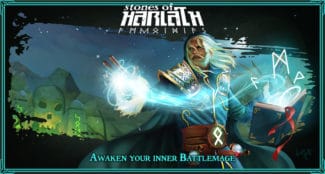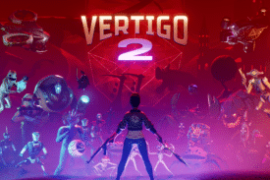Stones of Harlath’s throwback visuals charm to no end, but the game itself needs work. Read on for our Stones of Harlath review.
What’s old is new again or, rather, what was old and then new again got old and then new… again. Indie studio Garage Collective turned heads with the enjoyable Theta Legion, a snackable Doom throwback that brought retro character sprites and environments to life in VR. Swap out the 90’s shooter influence for classic dungeon crawler games and you have Stones of Harlath in a nutshell.
But, while not without charm, this is a bit of a case of diminishing returns.
You awaken on a mystical island and set about completing quests for villagers that basically involve working your way through increasingly difficult lairs (six in total) filled at first with rats and spiders but eventually featuring horrid fish men and, well, bigger spiders. Pretty much your standard fantasy fare, then, but Harlath’s real appeal is in its vivid recreation of classic visuals. The blocky sprites really pop in VR and environment designs — particularly the giant castles and temples — look gorgeous. I especially love the lines on the back of your character’s hands, which give the game a rustic texture.
Those visuals, mixed with the knowingly awful voice acting (unless it wasn’t knowing, in which case: eesh) make exploring this world an absolute highlight. I loved discovering what looked like gaming history brought to life. Stones of Harlath is definitely an experience to see more than it is play.
And that’s because the rest of Stones of Harlath isn’t terribly engaging. Combat is a mix of very basic VR sword-play of the Wii waggle variety and spell-casting that clearly had much more focus. While it’s empowering to hold a sword and make it burst into flames, and deeply satisfying to block incoming projectiles with your shield, I quickly found that simply flicking my wrist with my weapon was all I needed to do to quickly dispose of most enemies.
To summon one of six spells, meanwhile, you simply trace out a rune pattern in mid-air and then have a limited amount of ammo for the chosen magic. You start out with a standard fireball but Garage Collective does introduce some pretty interesting alternatives like wide-reaching magical shields to protect you from projectiles, life-draining orbs and even a teleport to help you navigate environmental hazards. Some of these could have been better used assigned to buttons rather than making you use a gesture every time you want to teleport, though.
To its credit, the developer occasionally makes sure you’re going to use the extra abilities. Some bosses throw attacks at lightning pace and you’ll need to slow time to avoid them. When enemies pile on, you can instantly stun a few with a magical cage to free up some space. These instances are rare, though; Harlath is a mostly simple affair. Walk down the hallway, take out the AI mostly programmed to charge you, beat a boss and return home. The cursor-based aiming feels primitive compared to the magical attacks in, say, The Unspoken, and the gestures don’t feel as organic as something like The Wizards. Inevitably the game will sometimes fail to pick up some gestures in the heat of battle, too. Ultimately Stones of Harlath has some really fun ideas for VR dungeon crawling, but the actual mechanics of the game feel a step behind contemporaries like Ancient Dungeon.
And that might be because there’s not much space to flesh these concepts out. The whole game takes around two hours to complete and, even then, there’s a lot of walking back and forth between NPCs on the island to pad it out. There isn’t much reason to return afterward aside from a wave-based arena mode and hidden treasures scattered across the island.
Setbacks like these are more frustrating than anything because, like I said, there are plenty of great ideas in Stones of Harlath. It just feels rushed and undercooked – I would have liked to see better variety in enemy design that forced me to use different attacks, and more time spent on the melee system to make it more satisfying. Stones of Harlath has the foundations for a memorable dungeon crawler, but each individual element would need a lot more work to make it one.
Stones of Harlath Review – Final Impressions
Garage Collective delivers another novel throwback with Stones of Harlath, but the retro revival aesthetic is easily the game’s main draw. Combat has some interesting ideas but is largely very basic and there’s very little content here. Garage Collective has something special with its signature art style, but it feels like it’s still searching for the perfect game to match it with.
For more on how we arrived at this score, read our review guidelines. What did you make of our Stones of Harlath review? Let us know in the comments below!








